
Pizzicato Five was a Japanese pop band formed in Tokyo in 1979 by multi-instrumentalists Yasuharu Konishi and Keitarō Takanami. After some personnel changes in the late 1980s, the band gained international fame as a duo consisting of Konishi and vocalist Maki Nomiya. With their music blending together 1960s pop, jazz and synth-pop, the group were a prominent component in the Shibuya-kei movement of the 1990s.

Shibuya-kei is a microgenre of pop music or a general aesthetic that flourished in Japan in the mid-to late 1990s. The music genre is distinguished by a "cut-and-paste" approach that was inspired by the kitsch, fusion, and artifice from certain music styles of the past. The most common reference points were 1960s culture and Western pop music, especially the work of Burt Bacharach, Brian Wilson, Phil Spector, and Serge Gainsbourg.
Indie pop is a music genre and subculture that combines guitar pop with DIY ethic in opposition to the style and tone of mainstream pop music. It originated from British post-punk in the late 1970s and subsequently generated a thriving fanzine, label, and club and gig circuit. Compared to its counterpart, indie rock, the genre is more melodic, less abrasive, and relatively angst-free. In later years, the definition of indie pop has bifurcated to also mean bands from unrelated DIY scenes/movements with pop leanings. Subgenres include chamber pop and twee pop.

The Fantastic Plastic Machine is the debut studio album by Japanese musician Fantastic Plastic Machine. It was released on October 10, 1997 by Readymade Records. The album was subsequently released in Germany on April 24, 1998 by Bungalow Records and in the United States on September 15, 1998 by Emperor Norton Records.

The Sound of Music by Pizzicato Five is a compilation album by Japanese pop band Pizzicato Five. The album was released in the United States on October 31, 1995 by Matador Records, serving as the band's second full-length, and third overall, American release on the label. Following Made in USA, The Sound of Music by Pizzicato Five is Matador's second compilation of Pizzicato Five's previously released material.

Sweet Pizzicato Five (スウィート・ピチカート・ファイヴ) is the sixth studio album by Japanese pop band Pizzicato Five. It was released on September 21, 1992 by the Nippon Columbia imprint Triad. The album marks a turn toward a more house music-influenced sound for the band.

Happy End of You is a remix album by Japanese pop band Pizzicato Five. The album was released on May 5, 1998 by Matador Records. It consists of remixes of songs from the band's album Happy End of the World, with the exception of "Contact", which originally appeared on Romantique 96.

Five by Five is an EP by Japanese pop band Pizzicato Five. It was released in the United States on July 19, 1994 by Matador Records, serving as the band's debut American release for the label. Five by Five was voted the best EP of 1994 in The Village Voice's year-end Pazz & Jop critics' poll.

Instant Replay (インスタント・リプレイ) is a live album by Japanese pop band Pizzicato Five. It was released on March 21, 1993 by the Nippon Columbia imprint Triad. The album was reissued by Readymade Records on March 31, 2006.

Darlin' of Discothèque (ダーリン・オブ・ディスコティック) is an EP by Japanese pop band Pizzicato Five, released on April 21, 1999 by Readymade Records.
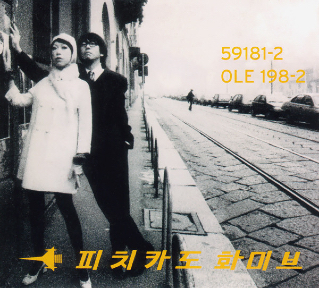
Happy End of the World (ハッピー・エンド・オブ・ザ・ワールド) is the tenth studio album by Japanese pop band Pizzicato Five. The album was released on June 21, 1997, by Readymade Records. In the United States, it was released by Matador Records on September 9, 1997, and peaked at number 32 on Billboard's Heatseekers Albums chart. A companion remix album, Happy End of You, was released in 1998. Happy End of the World was reissued by Readymade on March 31, 2006.

Point is the fourth studio album by Japanese musician Cornelius. It was released in Japan on October 24, 2001, by Trattoria Records, and in the United States on January 22, 2002, by Matador Records. Point peaked at number four on the Oricon Albums Chart. The album was reissued on CD by Warner Music Japan in 2019 with a second disc containing the Five Point One music video collection.

Fantasma is the third studio album by Japanese musician Cornelius, released on August 6, 1997, on his label Trattoria. Cornelius envisioned the album as "a one-on-one experience between the music and the listener. ... It starts with you entering into the journey and ends with you returning to reality." It peaked at number six on the Oricon Albums Chart and number 37 on the UK Independent Albums Chart. Three singles were issued from the album: "Star Fruits Surf Rider", "Free Fall", and "Chapter 8 – Seashore and Horizon –".

Overdose (オーヴァードーズ) is the eighth studio album by Japanese pop band Pizzicato Five. The album was released on October 1, 1994 by the Nippon Columbia imprint Triad. It is their first studio album not to feature founding member Keitarō Takanami, who departed the band earlier in the year. Overdose is the first of several Pizzicato Five albums to be themed around a famous city, in this case New York. The album pays tribute to soul music, and soul singer Stevie Wonder in particular, with several songs incorporating Wonder's signature instrument, the harmonica.
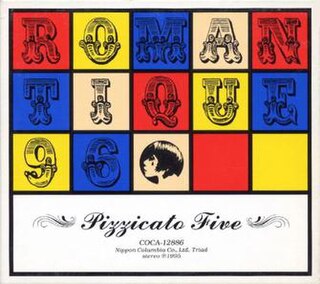
Romantique 96 (ロマンティーク96) is the ninth studio album by Japanese pop band Pizzicato Five. It was released on September 30, 1995 by the Nippon Columbia imprint Triad. The album is highly inspired by 1960s French cinema and music. It was reissued by Readymade Records on September 30, 2000 and March 31, 2006.
The discography of Japanese Shibuya-kei group Pizzicato Five includes 13 studio albums, one live album, one soundtrack album, 16 compilation albums, nine remix albums, six video albums, 13 extended plays and 22 singles.
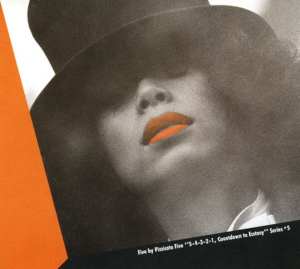
This Year's Girl (女性上位時代) is the fifth studio album by Japanese pop band Pizzicato Five. It was released on September 1, 1991 by the Nippon Columbia imprint Seven Gods, serving as the band's first album for Nippon Columbia. This Year's Girl is the first Pizzicato Five album to feature Maki Nomiya as lead vocalist. On the album, the band augmented their Shibuya-kei sound with elements of alternative dance and began to more fully incorporate sampling into their music.

Pizzicato Five is the twelfth studio album by Japanese pop band Pizzicato Five. The album was released on November 20, 1999 by Readymade Records. Under the title The Fifth Release from Matador, it was released in the United States on November 14, 2000 by Matador Records. Pizzicato Five was reissued on March 31, 2006.
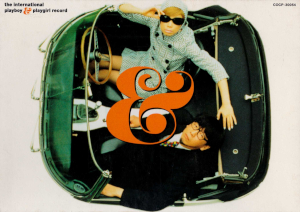
The International Playboy & Playgirl Record (プレイボーイ プレイガール) is the eleventh studio album by Japanese pop band Pizzicato Five. The album was released on October 1, 1998 by Readymade Records. Under the title Playboy & Playgirl, it was released in the United States on April 20, 1999 by Matador Records. The International Playboy & Playgirl Record was reissued on March 31, 2006.
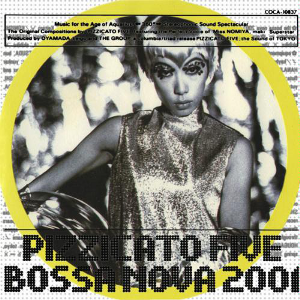
Bossa Nova 2001 (ボサ・ノヴァ2001) is the seventh studio album by Japanese pop band Pizzicato Five. It was released on June 1, 1993 by the Nippon Columbia imprint Triad. The band co-produced the album with acquaintance and fellow Shibuya-kei artist Cornelius. Following the house music-oriented Sweet Pizzicato Five the previous year, Bossa Nova 2001 signaled a return to the band's 1960s and 1970s-influenced pop style, mixed with elements of alternative dance.


















